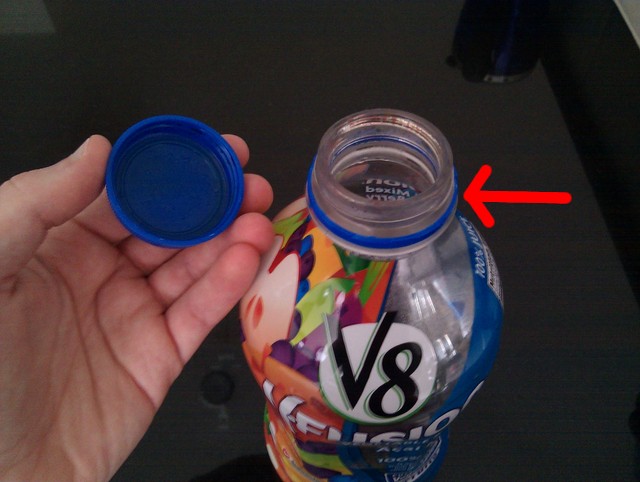
 |
| News | Profile | Code | Photography | Looking Glass | Projects | System Statistics | Uncategorized |
Blog |
Most plastic and glass bottles are recyclable, nowadays. Unfortunately, the plastic bottle caps are not as easily recyclable since they're made with a polymer called polypropylene. While the resin code for many plastic bottles is 1 (polyethylene terephthalate), the polypropylene is 5, since it has a different melting point. So, if you encounter a recycling bin that accepts resin code 1 and not 5, either hold on to the bottle cap or just toss it in the trash.
This is fine, but I'm a little curious about the little neck ring that stays on most plastic bottles after the cap is removed:

The little plastic ring on most bottles appears to be made of the same plastic as the bottle cap itself. Surely the environmentalists in the world don't expect everyone to pry off the little plastic ring and toss it separately, too? If not, then it seems that most plastic bottle recycling systems are still being contaminated with a good amount of polypropylene.
I'll admit, I tried to remove the plastic ring from plastic bottles for a few days, and it was a fairly unpleasant experience when I didn't have scissors on hand.
What's the deal?
Disclaimer: I'm not "green" by any stretch of the imagination, but I don't think sensible recycling is too crazy.
I don't really have a good answer for that, other than it's possibly more hip to be eco-friendly than cost-effective. I think it's a rare day when recycling and cost-effectiveness go together, although I suspect it happens from time to time.
Ah, just read http://en.wikipedia.org/wiki/PET_bottle_recycling. PET bottles are NOT recycled by the plants/fillers themselves but usually by "environmentally conscious" organizations and nonprofits (sometimes the government as well). So they're rarely re-used as bottles again. Which quite frankly is recycling 101, can't believe I missed that :)
Yes, most plastic recycling is chipped up and reformed, and on top of that in the US most or all recycled plastics cannot be re-used in food product packaging for sanitary purposes. There are /lots/ of other things that recycled plastic can be used in though (clothing, car parts, railroad ties, and thousands of other things).
The more important part of recycling is keeping these non-biodegradable products and materials out of landfills and incinerators (due to how they burn). Also they're non-renewable by nature of being oil-based, so in order to be sustainable materials they must be recycled or made from new (hopefully biodegradable) materials.
Mark - I'm curious - why do you say to hold onto the caps or throw them out instead of just recycling them separately? Polypropylene (5) is recyclable in many areas.
Ryan, in the break rooms and cafeteria at work we have recycling bins that are /only/ for plastic bottles. It says specifically "not for bottle caps" or something similar. Right next to it is usually a small bin that is dedicated for bottle caps. My guess is that the recycling service is cheaper if 5's are separated from everything else.
That being said, in my condominium development we've got a bin that says 1-5, so I just chuck everything in there, caps and all!
New comments are currently disabled for this entry.
     |
This HTML for this page was generated in 0.000 seconds. |
Wait, they recycle plastic bottles? As you pointed out, they're made of PET which is usually shipped from the supplier as a preform (test tube-like shape) and is blow molded into whatever shape the plant uses. Why would anyone recycle PET bottles when getting preforms is more cost-effective?